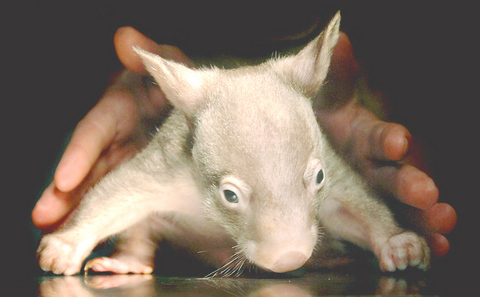Have you ever seen an animal like this one? It is called a wombat. Wombats are from Australia, and they don't live in any other place on the earth.
Wombats live underground in tunnels that they dig. They usually sleep during the day and come out to look for food at night.
Wombats look cute when they are young, like the wombat in this picture, but when they get big, they can weigh up to 35kg. Wombats are very strong animals, and they scratch and bite animals that might try to eat them. Sometimes animals try to follow wombats into their tunnels to attack them, but a wombat's backside is very hard, so biting it from behind usually doesn't work. (Kayleen Hartman, staff writer)

PHOTO : EPA
你看過像這樣子的動物嗎?它叫做「袋熊」。袋熊是澳洲的動物,在世界其他地方絕對看不到。
袋熊住在自己挖掘的地下隧道裡。牠們通常在白天睡覺,晚上出外覓食。
年幼的袋熊模樣可愛,就像這張照片裡的袋熊,不過牠們長大時,體重可達三十五公斤。袋熊是非常強壯的動物,會抓傷、啃咬想獵食牠們的動物。有時候動物想跟蹤袋熊到地道內攻擊牠們,但袋熊的臀部相當堅硬,想從背後咬牠們通常一點用處也沒有。 (翻譯:賴美君)

US President Donald Trump has renewed his ambition to take control of Greenland for national security reasons and questioned whether Denmark has any legal right to the Arctic island. The debate has revived scrutiny of how Greenland became part of Denmark, its current self-rule and path to independence, and Washington’s military footprint. HOW DID DENMARK GET GREENLAND? Greenland was inhabited by Inuit peoples from Asia and North America intermittently from around 2,500 BC. Around 985 AD, Vikings led by Erik the Red settled in southern Greenland, farming and building churches. Around the same time, ancestors of today’s Inuit arrived, living as hunters

Owls have long fascinated people with their distinctive appearance and mysterious habits. These nocturnal birds possess large, round eyes and a flat facial disc. Their feathers come in shades of brown, gray, or white, helping them blend easily into the darkness. The most remarkable trait of owls is that they can turn their heads without damaging blood vessels. Contrary to popular belief, they can only rotate their heads up to 270 degrees, not 360 degrees. Owls have 14 cervical vertebrae, which is twice as many as humans. This special physical structure compensates for their inability to move their eyes within their

AI-generated summaries are shaking up the media world. Tools like Google’s AI Overviews now provide users with direct answers above the search results, resulting in fewer people clicking on news links. For publishers who rely on that traffic to generate advertising revenue, this shift is hitting hard. The fallout is measurable. Many sites have seen a sharp drop in traffic since AI summary features rolled out. An analysis revealed that a news outlet that had once ranked first on Google lost up to 79% of its traffic when its link appeared beneath an AI-generated summary. Statistics also show that

A: Bloomberg just released its annual travel guide, titled “25 Best Places to Travel in 2026.” What were the best Asian destinations? B: There were actually six Asian hotspots: Taiwan’s Taipei, Malaysia’s Penang, Kazakhstan’s Almaty, Indonesia’s Rote Island, India’s Tiger Reserves, and Oman. A: With its mix of traditional food and modern cuisine, Taipei has become a rising food capital in Asia. B: As Bloomberg reported, “Taiwan is a place that bubbles up in culinary conversation because of its famed beverage, bubble tea, and its early adoption of modern night markets.” A: And Din Tai Fung has now